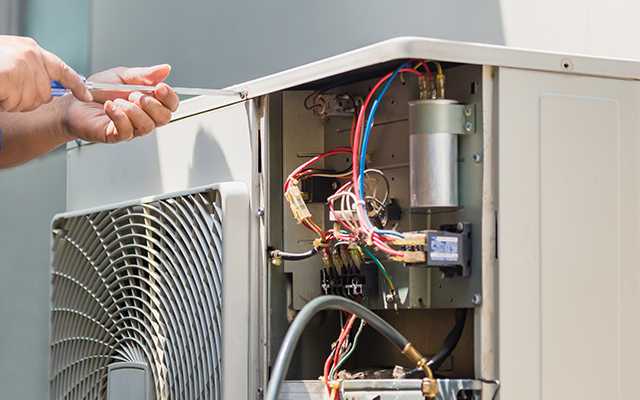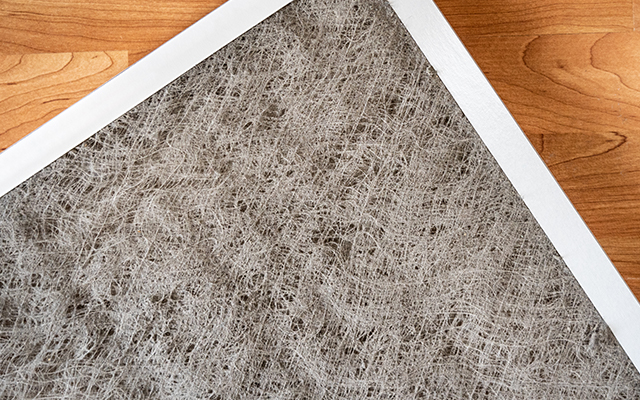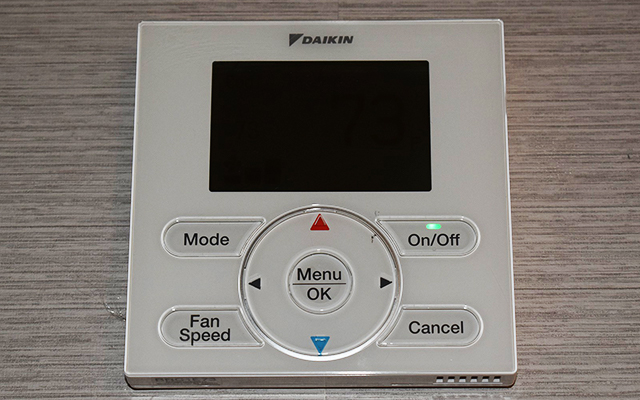
Prevent your HVAC unit from failing and potentially damaging your roof when extreme weather and temperatures settle in for the season. Knowing how to spot trouble with your HVAC unit and get it taken care of will help you save money and prevent more severe problems in the future.
elearning-training.com gathered information about 5 common HVAC problems, the inconveniences they can cause, and how to solve them before they cause expensive damages to the unit or the structure it’s meant to regulate.
What are the most common HVAC problems?
Your heating, ventilation, and air conditioning (HVAC) unit uses various technologies to control the temperature, humidity, and air purity in an enclosed space. The ultimate goal is to provide continuous thermal comfort and reasonable indoor air quality.
There are multiple reasons your HVAC system may stop functioning properly, and here are 5 of the potential reasons, the damage they can cause, and how to get them fixed:
1. Dirty Filters

Dirty air filters are one of the most common and repetitive issues affecting your HVAC’s performance. A dirty filter is also one of the most straightforward problems to fix. Your air filter(s) should be changed regularly. Replacement intervals will depend on your local air quality, whether you have pets, if you smoke, or even how/what you cook. You may need to change your filters every month.
At the most basic function, air filters remove impurities like dust, pet dander, or (higher grade filters) bacteria from the air that flows through the system. This improves the air quality within your home and protects your HVAC system from damage.
Solution: Maintain a schedule that reminds you at a set interval to inspect or replace your HVAC system’s air filters.
Tip: For those suffering from allergies or may have a compromised immune system, HEPA filters are designed to remove a minimum of 99.97 percent of particles in the air 0.3 microns or larger. This title is endorsed by the Energy Department. While most commonly used in commercial settings requiring extremely clean air, like hospitals and laboratories, they can be used in residential structures.
2. Clogged Drain Pipes and Water Leaks
Air conditioners and high-efficiency furnaces tend to produce condensate. Drain pipes are used to encourage proper and consistent water drainage. However, furnaces can leak water if the drain lines are either clogged or develop cracks. In residential structures, this problem can be avoided by helping keep the drain lines clean by pouring bleach down the drain periodically.
Other potential leak sources may be the collector box, heat exchanger, or drain pan. A professional service technician should be contacted to determine the source of the water leak and repair options.
Note: Water leaks can go on for weeks, months, or years depending on their location and how frequently your HVAC unit is serviced. According to atlantacommercialroofingcontractors.com, these leaks can result in costly structural damage to your home (when the HVAC unit is installed on your rooftop, this problem can lead to roofing system failure).
Solution: Have your HVAC unit thoroughly inspected at least once per year by a professional, licensed technician.
3. Lack of Maintenance
One of the more common causes of HVAC problems and mechanical failure is disregarding regular system maintenance. Regularly scheduled maintenance by a professional, licensed service contractor is necessary to keep your system in top working order.
Many typical furnace or system repairs can be avoided with regular maintenance by a certified professional service contractor. Home heating and cooling systems are typically expensive investments. Why not protect that investment?
If you neglect to perform regular maintenance, you will most likely experience unexpected and costly structural damages, increased energy cost, and poor unit performance, or complete breakdown.
Solution: Scheduling regular HVAC unit inspections will help you stave off or permanently avoid expensive HVAC repairs or replacements.
4. Thermostat Problems

Thermostat technology has changed how we interact with our heating and cooling, and even when controlling your HVAC unit on-site or remotely. Smart, programmable HVAC thermostats can help you economize on energy costs while maintaining a more comfortable environment.
Programming the correct thermostat settings for your home may take some time and effort on your part. Whichever thermostat you settle on for your home, read the instruction manual to ensure that you’re getting the most out of its features and capabilities.
Even the best or most sophisticated thermostats can malfunction. If you’re having difficulties maintaining specific temperatures in your home, a maintenance inspection may identify thermostat sensor problems or other developing problems.
Solution: Know the capabilities of your thermostat and how to use them to your advantage. When you encounter a glitch, don’t hesitate to get a professional involved to guide you through it.
5. Pilot or Ignition Issues
Ignition problems can result from several malfunctions. A dirty pilot, change in airflow, obstructed flame sensor, or clogged burners can cause a pilot outage, furnace lockout, or delayed burner ignition.
This problem could also result from a gas supply problem or wear and tear of an ignition component. When pilot and ignition issues arise, it is best to have them seen and handled by a trained service technician familiar with the dangers and required protocols for handling natural gas and high voltage.
Solution: Your HVAC’s pilot system, gas connection, and exhaust should all be regularly inspected and serviced to avoid potential gas poisoning or explosions.
What Can Go Wrong With HVAC?
In this article, you discovered 5 common HVAC problems and how they can be treated or avoided altogether.
Keeping your HVAC unit properly maintained and serviced will help you avoid air conditioning interruptions, structural damages, and premature unit replacement.
Ignoring HVAC problems can lead to catastrophic damages to your home, lower breathing air quality, and even lead to potentially fatal gas leaks.
Sources:
energy.gov/energysaver/common-air-conditioner-problems
epa.gov/iaq-schools/heating-ventilation-and-air-conditioning-systems-part-indoor-air-quality-design-tools
energystar.gov/campaign/heating_cooling/maintenance_checklist